Afghans who helped British forces evicted in UK, stranded in Pakistan
By Reza Javadi
Thousands of Afghans who worked with British forces for two decades of foreign military occupation in the Hindu Kush country and qualify under the British government’s resettlement schemes remain stranded in Pakistan and are being evicted from homes in the UK.
Amid “pressure” on existing accommodation facilities for Afghans across the UK, with British Home Office ordering their eviction in Yorkshire, the situation has only turned grim.
Earlier this month, a report by The Independent revealed that over 1,000 Afghans eligible to come to the UK for resettlement are stranded across Pakistan, waiting for the UK government to evacuate them, after London ceased Royal Air Force (RAF) extraction flights from Islamabad in November last year.
No flights have been chartered for Afghans living for the past year in Pakistani hotels by the British government since last November. They have been abandoned and forced to fend for themselves.
Among those stranded are former interpreters, medics, and embassy employees, as well as at least 500 children, who are unable to leave their hotels after being granted eligibility to settle in the UK by the Ministry of Defense.
They are “stuck in their hotel rooms”, according to media reports and if they leave the hotel premises, they risk arrest and deportation back to Afghanistan, as their Pakistani visas have expired.
Describing his life in a hotel in Islamabad, Pakistan’s capital city, one Afghan former interpreter, who used to work for British forces at the height of the military occupation, said he feels like he is going crazy after waiting for more than a year for relocation to the UK.
“I am a human. I need to work. I need a life. I need to enjoy my life. This is my sin, that I worked with British forces. I am like a prisoner, and we are not safe in Pakistan,” he was quoted as saying.
“I don’t know what I am doing. I have got a mental case. I have anxiety. If they don’t give me an answer in two months I will run away from this place. I will go illegally to European countries to get to safety.”
He said they have been waiting to be evacuated for over a year, calling the British Home Office “cruel” for making them feel like “prisoners” outside their country.
“I have to evade the police here. A few days ago they caught me at night. I had to pay a bribe to be released. I’m scared that they might return me to Afghanistan next time,” said the son of a former interpreter who worked with British forces in Camp Bastion.
“I’m all day long in one room; you could say it’s like being in jail but without any crime.”
Another Afghan interpreter who used to work for the Canadian military said in an interview last year that he and his family are stuck in a hotel in Islamabad and his children keep repeating the word “e-mail” without knowing the meaning of it.
“These kids keep asking me to take us to the park. I said, ‘No, I’m not going to take you because I’m scared’,” he said.
8,000 Afghans waiting in a queue
There are a total of 8,000 Afghans waiting to come to the United Kingdom, according to a £1.6bn Home Office contract.
“HMG estimates that a further c.8000 Afghans who qualify under our schemes (ARAP) are still to be resettled in the UK. MOD and FCDO are keen that this happens quickly given the ongoing risks to them in Afghanistan,” the Home Office states in the contract.
The US and the UK carried out a hasty and botched withdrawal from Afghanistan leaving thousands behind at the risk of being arrested or killed.
The evacuation process was under the Afghan Relocations and Assistance Policy (ARAP) scheme, which was introduced In April 2021 - before the Taliban took control of Afghanistan.
Later in January 2022, the government also opened the Afghan Citizens' Resettlement Scheme (ACRS), which it says will allow up to 20,000 refugees to settle in the UK.
Around 4,300 Afghans eligible to come to the UK under the ARAP scheme are yet to arrive. Of those, more than 3000 are still in Afghanistan, according to British media, with the rest in other countries.
According to governmental figures, more than 24,000 people have arrived in the UK from Afghanistan as of December 2022, including British nationals.
Of these, over 21,000 individuals have already been brought to the UK under the Afghan ARAP and ACRS schemes. About 15,000 of this population arrived during Operation Pitting, a hasty evacuation plan that stands like a scandal rather than an accomplishment.
Addressing the House of Commons last month, Labour MP Dan Jarvis MP, who served as a soldier in Afghanistan, blasted the government for failing to keep its promise.
“The government’s failure to get a grip on ARAP means we now find ourselves in a farcical situation, where people who risked their lives in support of our mission and have been promised safe passage to the UK have to do the legwork and embark on a house-hunting mission if they want to get here.”
The British House of Commons Defense Committee published a report that called the withdrawal from Afghanistan “a dark chapter in British military history.”
Gen John McColl, who served in Afghanistan as the first head of NATO’s International Security Assistance Force (ISAF) in Afghanistan told BBC Radio 4 that the defense secretary, Ben Wallace, and other ministers should “hang their heads in shame”.
Britain’s original evacuation of Afghans was “random” and at times dogs had been prioritized over people, he said, referring to the Nowzad animal welfare charity, whose animals could leave on a charter flight, which the MPs said had used "significant" resources.
“The system was broken when we withdrew from Kabul last year and it remains broken. It was a source of shame then and it continues to be a source of shame,” McColl said.
UK’s scandalous evacuation
In a damning report, revealing the dark side of the UK evacuation policy from Afghanistan, Raphael Marshall, who previously worked on the Foreign Office's Afghanistan crisis response at the time of the Afghan evacuation in August, slammed the foreign office’s controversial decision to relocate Nowzad staff and animals.
“Assistance crossing the Pakistani Border was provided for Nowzad’s staff. This demonstrates that HMG could have provided evacuees with assistance across the Pakistani border if it wished to but chose not to.” Marshall wrote.
“Nowzad’s staff received help traveling to Pakistan but not others with UK visas, including British Army interpreters, did not. What was the policy justification for assisting Nowzad’s staff in crossing to Pakistan but not British Army interpreters?” he asked.
In his written evidence to the Foreign Affairs Committee, Marshall estimated that between 75,000 and 150,000 people had applied for evacuation under the UK’s Leave Outside the Rules (LOTR) scheme in August 2021.
Applicants included Afghan soldiers, politicians, journalists, civil servants, feminists, aid workers, and judges. They were people who feared their lives were at risk as a result of their connection to the UK and the West and were therefore eligible for evacuation.
However, “fewer than 5 percent of these people have received any assistance,” Marshall wrote in his letter, stressing that “it is clear that some of those left behind have since been murdered.”
He further notes that the process by the Foreign, Commonwealth, and Development Office (FCDO) to select among applications for evacuation was “not credible”, and adds that the prioritization decisions to evacuate which afghans “were not made rationally” and that the decisions were “made badly.”
Marshall goes on to reveal that the purpose of the evacuation was to showcase the British assistance in the Kabul evacuation. Thus, selecting applicants who would prove this and speak out for the UK was of high priority.
“Accurately identifying the correct people to rescue was imperative as this objective would not be attained unless we selected the right people for evacuation,” Marshall wrote, describing shocking scenes at the heart of the foreign office.
“In essence, this was primarily a political rather than a humanitarian evacuation. The evacuation’s objective was clearly not humanitarian as such but primarily intended to demonstrate the UK’s credibility as a friend.”
After his writing to the Permanent Under Secretary to report about the flaws and failures of the British evacuation process and the breaches of the Civil Service Code, an investigation was launched on the issue and subsequently concluded that no breaches of the Civil Service Code had occurred.
Marshall wrote in his damning statement that he was not convinced about the results.
“I am unconvinced by the finding that the Afghan Special Cases evacuation process was compatible with the Civil Service Code. I do believe that the FCDO’s institutional approach amounted to a failure to abide by the values set out in the Civil Service Code.” Marshall wrote in his letter at the time.
It was also revealed by the Observer newspaper at the time that thousands of urgent messages from MPs and charities, detailing urgent cases of Afghans trying to escape from Kabul, had not been read by the end of the UK evacuation from Afghanistan. Marshal writes in his evidence that there were regularly 5,000 unread emails, some with heartbreaking subject lines such as: “Please save my children.”
However, then-British Foreign Secretary, Dominic Raab, who was on holiday in Crete as Kabul was overrun by the Taliban, said he did not accept Marshal's description of the scenes in the foreign office during the evacuations.
Eviction of Afghan refugees in the UK
Afghan refugee families in Yorkshire, a city in northern England, who were uprooted from London and taken to Yorkshire earlier this year, were recently issued with an eviction letter from the Home Office, forcing them to move home, leaving jobs and schools.
These families were airlifted out of Kabul to the UK in August 2021 under the ARAP scheme through Operation Pitting.
“For the avoidance of doubt, if possession is not delivered upon by the notice date, you will be a trespasser and the secretary of state for the home department shall be at liberty to evict you from the property,” said the letter signed by Home Secretary Suella Braverman.
Home Office officials said the temporary bridging accommodation or hotel residents might not receive any alternative offer for their accommodation and may have to find their own accommodation instead.
“From 2 May 2023, the existing matching process will cease to exist ... It is likely that most people will not receive an allocation through the new process, and we encourage you to find your own accommodation wherever possible,” the letter stated.
Even those who surrendered to the Home Office’s order, including a soldier, a translator, and a political adviser, said they have been looking for homes themselves but had been thwarted by slow bureaucracy within the Home Office and local councils, which stops them from securing a safe home for their families.
“There have been problems for all of us – with either the guarantor, the deposit or the eligibility of the local authority, or not having a job. This has all been made worse because we have been moved from London to Yorkshire, leaving jobs and contacts behind,” one of the refugees was quoted as saying.
Enver Solomon, CEO of the Refugee Council, told The Independent it was “entirely unreasonable to expect Afghan refugees to suddenly move out of hotels without offering suitable alternatives when the reality is that finding affordable housing on the market is a real challenge”.
“We are deeply concerned about the approach taken by the Home Office, which is likely to lead to Afghans being left homeless and destitute on our streets,” he added.
Labour’s shadow defense secretary John Healey depicted the government’s new plans as “shameful”.
“The Conservatives are failing Afghans who put their lives at risk to support our armed forces. By kicking out these Afghan families with no home to move into, ministers are making them homeless and breaking the promise Britain made to provide a new life here in the UK,” he noted.
The development came after the government decided in March to evict around 8,000 Afghans who are living in hotels in the UK after fleeing the Taliban in August 2021.
As the situation in Afghanistan continues to deteriorate under Taliban rule, with the situation made worse by Afghan assets frozen by the US, the lives of those who are left back remain in grave danger.
The UK government has failed to perform proper action to ensure their safety, and its handling of the situation has been denounced by rights groups and even by British lawmakers.
In a parliamentary briefing last year, nine expert groups on Afghanistan criticized the British government’s resettlement schemes as “unjustifiably restrictive”.
UN warns of ‘shocking’ Sudanese paramilitary war crimes in El Fasher
VIDEO | Fuel shortages in Gaza hinder emergency services
VIDEO | Another US government shutdown looms as ICE furor grows
VIDEO | EU lawmakers condemn Trump over US human rights abuses
VIDEO | Iranian Embassy marks 47 years since Islamic Revolution with high-level attendance
Funding lapse set to trigger US Department of Homeland Security shutdown
Gaza’s civil defense says 8,000 bodies of genocide victims remain under rubble
Iran: Israeli violations main obstacle to peace, security in Syria


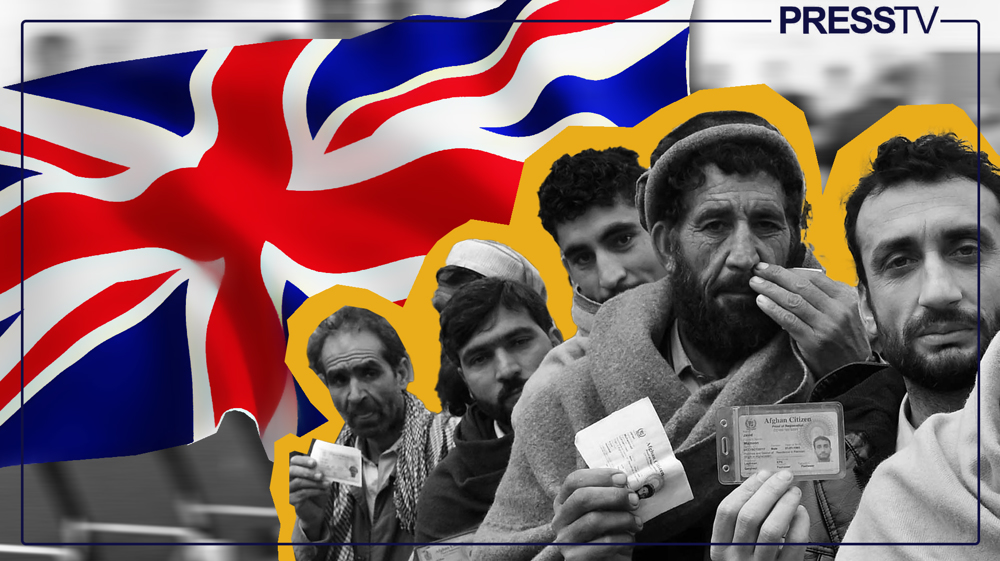
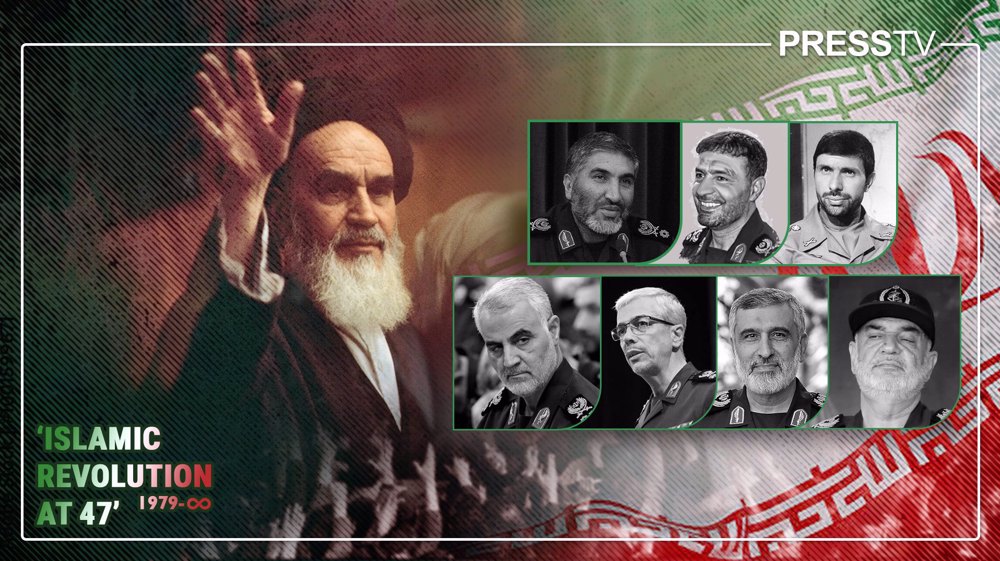
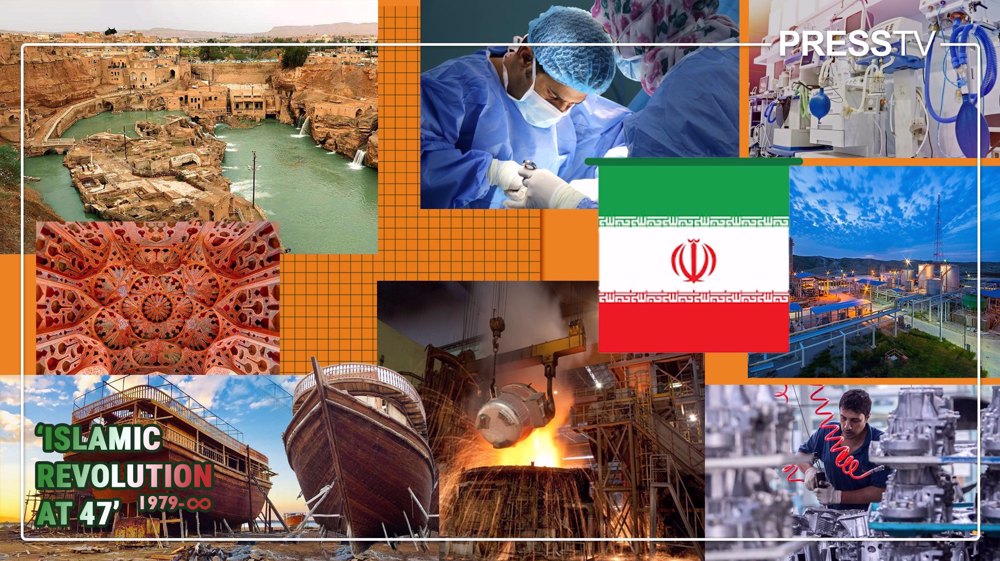




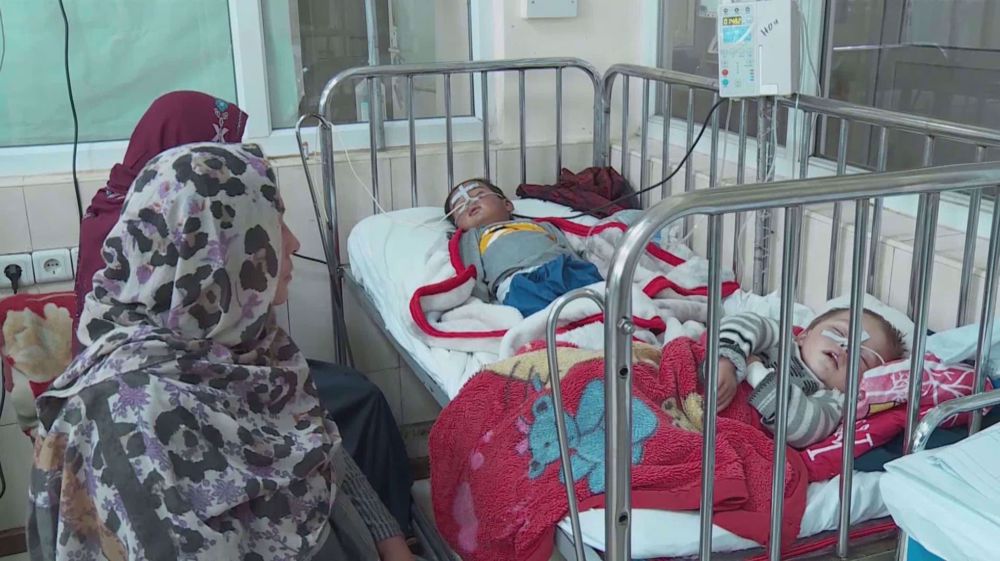

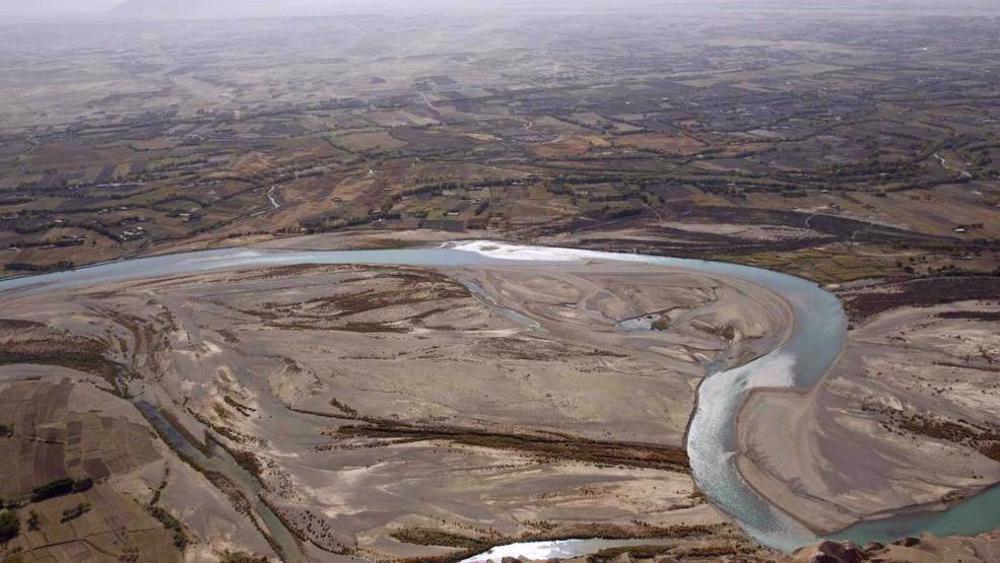
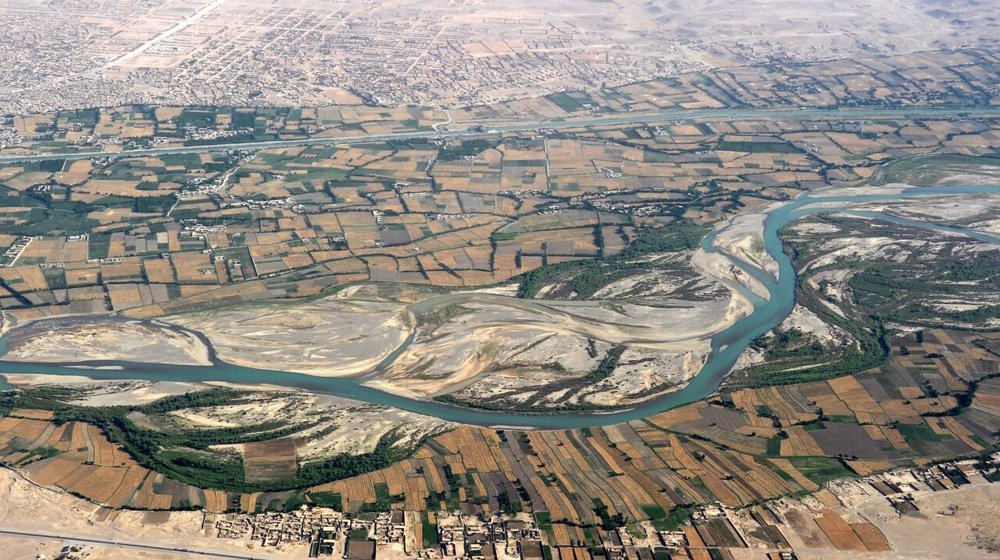

 This makes it easy to access the Press TV website
This makes it easy to access the Press TV website